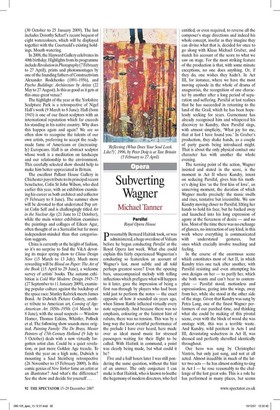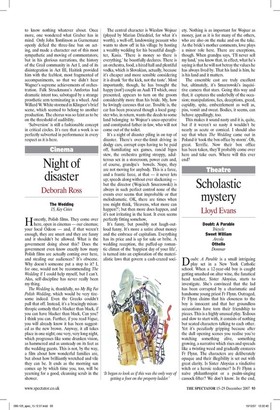Subverting Wagner Michael Tanner
Parsifal Royal Opera House presumably Bernard Haitink took, or was administered, a huge overdose of Valium before he began conducting Parsifal at the Royal Opera last week. What else could explain this fairly experienced Wagnerian's conducting so featureless an account of Wagner's last, most subtle and all told perhaps greatest score? Even the opening bars, unaccompanied melody with telling inflections which prefigure what will happen to it later, gave the impression of being a first run-through by players who had been told just to perform the notes — the exact opposite of how it sounded six years ago, when Simon Rattle inflected virtually every note separately. And because there was no emphasis, colouring or the faintest hint of rubato, there was no tension. This was by a long way the least eventful performance of the prelude I have ever heard, here made over as ideal mood music for stressed passengers waiting for their flight to be called. With Haitink in command, a point was clearly being made, but what could it be?
Five and a half hours later I was still pondering the same question, without the hint of an answer. The only conjecture I can make is that Haitink, who is known to loathe the hegemony of modern directors, who feel entitled, or even required, to reverse all the composer's stage directions and indeed his whole concept, insofar as they imagine they can divine what that is, decided for once to go along with Klaus Michael Gruber, and match his account of the score to what we saw on stage. For the most striking feature of the production is that, with some minute exceptions, no one does anything. Or, if they do, one wishes they hadn't. In Act III, for instance, where we have the most moving episode in the whole of drama of anagnorisis, the recognition of one character by another after a long period of separation and suffering, Parsifal at last realises that he has succeeded in returning to the land of the Grail, which he has been hopelessly seeking for years. Gurnemanz has already recognised him and whispered his discovery to Kundry, then Parsifal sings, with utmost simplicity, 'What joy for me, that at last I have found you.' In Gruber's production, they shake hands, as a couple of party guests being introduced might. That is about the only physical contact one character has with another the whole evening.
The turning point of the action, Wagner insisted and stated in the score, is the moment in Act II where Kundry, intent on seducing Parsifal, gives him his mother's dying kiss 'as the first kiss of love', an unnerving moment, the duration of which Wagner marks precisely: the music swells and rises, tentative but irresistible. We saw Kundry moving closer to Parsifal, lifting her hands to hold his face, but he backed away and launched into his long expression of agony at the fierceness of desire — and no kiss. Most of the time there was no exchange of glances, no interaction of any kind, in this work where everything is communicated with understated gestures, but ones which crucially involve touching and feeling.
In the course of the enormous scene which constitutes most of Act II, in which Kundry tries one tack after another, with Parsifal resisting and even attempting his own designs on her — to purify her, which she both wants and can't bear to contemplate — Parsifal stood, motionless and expressionless, gazing into the wings, away from her, while she stood at the other side of the stage. Given that Kundry was sung by Petra Lang, one of the finest Wagner performers of our parched time, and thinking what she could be making of this pivotal scene, even with the block of wood she was onstage with, this was a terrible waste. And Kundry, wild penitent in Acts I and III, devastating seductress in Act II, was dressed and perfectly shevelled identically throughout.
Our hero was sung by Christopher Ventris, but only just sung, and not at all acted. Almost inaudible in much of the latter two acts — he has almost nothing to sing in Act I — he rose reasonably to the challenge of the last great solo. This is a role he has performed in many places, but seems to know nothing whatever about. Once more, one wondered what Gruber has in mind. Only John Tomlinson as Gurnemanz openly defied the three-line ban on acting, and made a character out of this most sympathetic and moving of commentators; but in his glorious narrations, the history of the Grail community in Act I, and of its disintegration in Act III, Haitink provided him with the feeblest, most fragmented of accompaniments, so that we didn't hear Wagner's supreme achievements of orchestration. Falk Struckmann's Amfortas had dramatic intent too, sabotaged by a strange prosthetic arm terminating in a wheel. And Willard W. White stormed in Klingsor's brief scene, which seemed to belong to another production. The chorus was so faint as to be on the threshold of audibility.
'Subversion' is still a fashionable concept in critical circles. It's rare that a work is so perfectly subverted in performance in every respect as it is here.


































































































 Previous page
Previous page